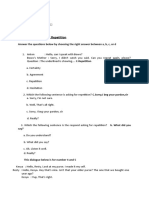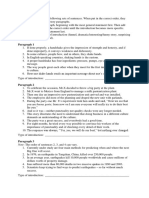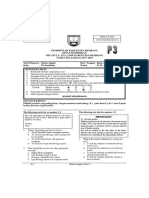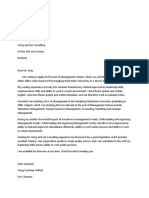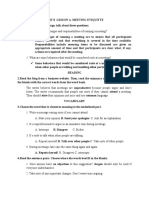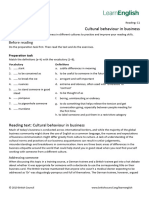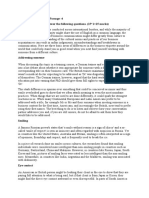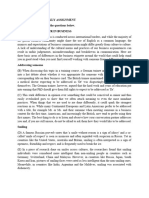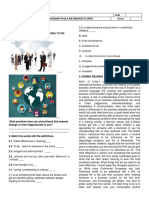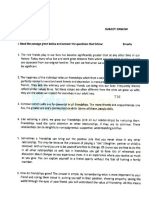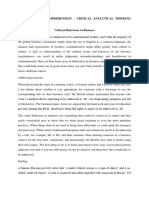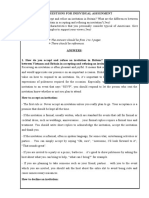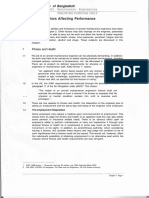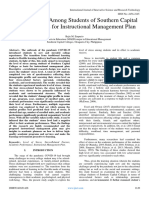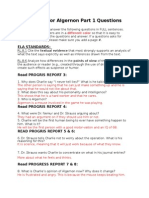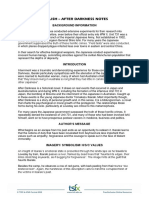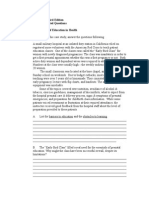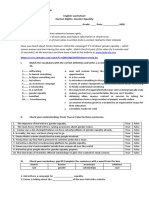LearnEnglish Reading C1 Cultural Behaviour in Business
LearnEnglish Reading C1 Cultural Behaviour in Business
Uploaded by
Serly FimasariCopyright
Available Formats
Share this document
Did you find this document useful?
Is this content inappropriate?
Copyright:
Available Formats
LearnEnglish Reading C1 Cultural Behaviour in Business
LearnEnglish Reading C1 Cultural Behaviour in Business
Uploaded by
Serly FimasariCopyright:
Available Formats
Nama : Nurfadillah Tul Zannah Siregar
Nim : 0309302079
Jurusan/Sem: PIPS3
Dosen : Maryati Salmiah, S.pd, M.Hum
Reading: C1
Cultural behaviour in business
Reada blog post about doing business in different cultures topractise and improve your
reading skills.
Before reading
Do the preparation task first. Then read the text and do the exercises.
Preparation task
Match the definitions (a–h) with the vocabulary (1–8).
Vocabulary Definitions
1. …… stark a. subtle differences in meaning
2. …… to be conceived as b. to be useful to someone in the future
3. …… to break the ice c. arrogant and self-important
4. …… nuances d. extreme and obvious, often used with ‘difference’ or
5. …… to stand someone in ‘contrast’
good stead e. to be thought of as
6. …… pompous f. boring, uninteresting or ordinary
7. …… to pigeonhole someone g. todo something that helps relieve the tensionand
8. …… mundane get conversation going, especially between people
meeting for the first time
h. to label someoneand put them in arestrictive
category
© 2019 British Council www.britishcouncil.org/learnenglish
Reading text: Cultural behaviour in business
Much of today’s business is conducted across international borders, and while the majority of
the global business community might share the use of English as a common language, the
nuances and expectations of business communication might differ greatly from culture to
culture. A lack of understanding of the cultural norms and practices of our business
acquaintances can result in unfair judgements, misunderstandings and breakdowns in
communication. Here are three basic areas of differences in the business etiquette around the
world that could help stand you in good stead when you next find yourself working with
someone from a different culture.
A famous Russian proverb states that ‘a smile without reason is a sign of idiocy’ and a so-
called ‘smile of respect’ is seen as insincere and often regarded with suspicion in Russia. Yet
in countries like the United States, Australia and Britain, smiling is often interpreted as a sign
of openness, friendship and respect, and is frequently used to break the ice.
In a piece of research done on smiles across cultures, the researchersfound that smiling
individuals were considered more intelligent than non-smiling people in countries such as
Germany, Switzerland, China and Malaysia. However, in countries like Russia, Japan, South
Korea and Iran, pictures of smiling faces were rated as less intelligent than the non-smiling
ones. Meanwhile, in countries like India, Argentina and the Maldives, smiling was associated
with dishonesty.
Eye contact
An American or British person might be looking their client in the eye toshow that they are
paying full attention to what is being said, but if that client is from Japan or Korea, they might
find the direct eye contact awkward or even disrespectful. In parts of South America and
Africa, prolonged eye contact could also be seen as challenging authority. In the Middle East,
eye contact across genders is considered inappropriate, although eye contact within a
gender could signify honesty and truthfulness.
Having an increased awareness of the possible differences in expectations and behaviour can
help us avoid cases of miscommunication, but it is vital that we also remember that cultural
stereotypes canbe detrimental to building good business relationships. Although national
cultures could play a part in shaping the way we behave and think, we are also largely
influenced by the region we come from, the communities we associate with, our age and
gender, ourcorporate culture andour individual experiences ofthe world. Theknowledge of
the potential differences should therefore be something we keepat the back of our minds,
rather than something that we use to pigeonhole the individuals of an entire nation.
© 2019 British Council www.britishcouncil.org/learnenglish
Tasks
Task 1
Circle the correct answer.
1. The British trainee felt that people who want to be addressed as ‘Dr’ must be …
a. hard-working.
b. conceited and self-important.
c. doing a medical degree.
d. from Germany.
2. If you are not sure how to address someone, you should …
a. use the title you see on their business card.
b. make your decision based on cultural stereotypes about their country.
c. address them the way you’d like to be addressed.
d. ask them what they would like you to call them.
3. There might be a misunderstanding if an American smiles at a Russian business associate
because the Russian might think that the American is …
a. being fake.
b. challenging their authority.
c. trying to break the ice.
d. disrespectful.
4. The Japanese, South Koreans and Iranians might interpret a smiling face as being …
a. friendlier.
b. less open.
c. not as intelligent.
d. dishonest.
5. Americans and British people sometimes use eye contact to show that they …
a. like the speaker.
b. are really listening to what is being said.
c. are honest andtruthful.
d. are attending to every need of the speaker.
© 2019 British Council www.britishcouncil.org/learnenglish
6. The last paragraph warns the reader not to …
a. engage in international business.
b. let national cultures shape the way we behave and think.
c. let miscommunication damage our business relationships.
d. overgeneralise using our knowledge of cultural stereotypes.
Task 2
Are the sentences true or false?
Answer
1. When doing business internationally, there is a possibility that we might True False
misinterpret what eachother is saying even though we are speaking
the same language.
2. To the German trainee, having a PhD is equivalent to being amedical True False
doctor.
3. Sometimes, the smallest things can trigger a huge emotional response True False
in us, especially when they are things we are not used to.
4. In the research done to the perceptions of smiles, people from True False
different countries were asked to rate photos of smiling faces and non-
smiling faces.
5. Making eyecontact can be interpreted in different ways in different True False
cultures but is almost always a positive thing.
6. The writer recommends keeping possible cultural differences in the True False
forefront of our minds when doing business with people with different
cultures.
Discussion
What practices have you encountered that seemed strange or even inappropriate to you?
Nothing, because greeting someone, smiling, eye contact are things that respect
someone who is again in front of us
© 2019 British Council www.britishcouncil.org/learnenglish
ANSWER
Preparation task
1. d
2. e
3. g
4. a
5. b
6. c
7. h
8. f
Task 1
1. b
2. d
3. a
4. c
5. b
6. d
Task 2
1. True
2. False
3. True
4. True
5. False
6. False
© 2019 British Council www.britishcouncil.org/learnenglish
You might also like
- RDG 15 - Cultural Behaviour in BusinessDocument4 pagesRDG 15 - Cultural Behaviour in Businessrogerioaalmeida-1Noch keine Bewertungen
- MINI TEST 7.1 (ANSWER Group) EditedDocument4 pagesMINI TEST 7.1 (ANSWER Group) EditedDuy Nguyễn HoàngNoch keine Bewertungen
- Light & McNaughton, 2012, ReviewDocument17 pagesLight & McNaughton, 2012, ReviewPimentelbncNoch keine Bewertungen
- Exercise of Asking For Repetition: Answer The Questions Below by Choosing The Right Answer Between A, B, C, or DDocument7 pagesExercise of Asking For Repetition: Answer The Questions Below by Choosing The Right Answer Between A, B, C, or DKyyTzyNoch keine Bewertungen
- LearnEnglish Listening A1 Business CardsDocument4 pagesLearnEnglish Listening A1 Business CardsAndre AcilNoch keine Bewertungen
- English 1-Meeting 8-Main IdeaDocument14 pagesEnglish 1-Meeting 8-Main IdeaIlyas Al'barNoch keine Bewertungen
- Restless Pursuer of LuxuryDocument1 pageRestless Pursuer of LuxuryMinh Châu100% (1)
- Chapter 7 Comparison or Contrast ParagrahpsDocument9 pagesChapter 7 Comparison or Contrast ParagrahpsChrin Visal100% (1)
- 10.english 1-Meeting 10-Finding Word Meanig Using Context CluesDocument16 pages10.english 1-Meeting 10-Finding Word Meanig Using Context CluesIlyas Al'barNoch keine Bewertungen
- English For Business Communication - SocializingDocument13 pagesEnglish For Business Communication - SocializingGomgom SitungkirNoch keine Bewertungen
- Unit 6 - Sorry To Interrupt, But...Document25 pagesUnit 6 - Sorry To Interrupt, But...LK Chiarra Panaligan50% (2)
- 01 - Introductory Paragraph ExerciseDocument1 page01 - Introductory Paragraph ExerciseTika VirginiyaNoch keine Bewertungen
- Tugas TOEFL Grammar Gerund & To Infinitif by Fetri HellenaDocument3 pagesTugas TOEFL Grammar Gerund & To Infinitif by Fetri HellenaILMA FITRIANTINoch keine Bewertungen
- S1 - Types of Meetings - Juan TorresDocument1 pageS1 - Types of Meetings - Juan TorresJuan T.Noch keine Bewertungen
- Bahasa Inggris Bisnis II - Module 12Document11 pagesBahasa Inggris Bisnis II - Module 12EVI MAYA SAFITRI100% (1)
- Intensive Reading Final ExamDocument8 pagesIntensive Reading Final ExamUlinuha DahlinaNoch keine Bewertungen
- Tugas Bahasa InggrisDocument1 pageTugas Bahasa InggrisdhyaNoch keine Bewertungen
- Soal TO Bahasa Inggris Kelas 9Document8 pagesSoal TO Bahasa Inggris Kelas 9Fatma Isma 'Mamanya Talitha'Noch keine Bewertungen
- The Text Below Is About Selvi, A Successful Gardener.: Do (4) Some Part Time Gardening. As Time Passed, It BecameDocument11 pagesThe Text Below Is About Selvi, A Successful Gardener.: Do (4) Some Part Time Gardening. As Time Passed, It BecameSuraya Binti SharipNoch keine Bewertungen
- Asking For PermissionDocument27 pagesAsking For PermissionM Rizq GiansyahNoch keine Bewertungen
- Application Letter Latihan SoalDocument4 pagesApplication Letter Latihan SoalMelati AlriyaniNoch keine Bewertungen
- Tugas B.ing (Peminatan)Document5 pagesTugas B.ing (Peminatan)Lulu IlmiNoch keine Bewertungen
- All Values in The Economic System Are Measured in Terms of MoneyDocument2 pagesAll Values in The Economic System Are Measured in Terms of MoneyYayank Emilia Darma100% (2)
- Soal DescriptiveDocument17 pagesSoal DescriptiveLydiaNoch keine Bewertungen
- Soal UAS - English XI - Des 2014Document8 pagesSoal UAS - English XI - Des 2014nurulinaNoch keine Bewertungen
- Answer Sheet - Mayang - Nasya - NoviraDocument3 pagesAnswer Sheet - Mayang - Nasya - NoviraNandaa PutriNoch keine Bewertungen
- Ulangan Try OutDocument1 pageUlangan Try OutAprilia Susanti100% (1)
- Unit 8Document5 pagesUnit 8Enhmaa TS.Noch keine Bewertungen
- Contoh Essay ParagraphDocument1 pageContoh Essay ParagraphabankmaNoch keine Bewertungen
- Latihan Soal Discussion TextDocument4 pagesLatihan Soal Discussion TextNurul WahyuniNoch keine Bewertungen
- LearnEnglish Reading C1 Cultural Behaviour in BusinessDocument5 pagesLearnEnglish Reading C1 Cultural Behaviour in BusinessKonstantina KatsoraNoch keine Bewertungen
- C1 Cultural Behaviour in BusinessDocument4 pagesC1 Cultural Behaviour in Businessjohnnorton.academyNoch keine Bewertungen
- Cultural Behaviour in BusinessDocument4 pagesCultural Behaviour in BusinessAmeni KhNoch keine Bewertungen
- Reading C1 Cultural BehaviourDocument6 pagesReading C1 Cultural BehaviourMaria Jose Martínez RoldánNoch keine Bewertungen
- Mentoria Thaís - 4th May, 2021 - A Talk About Motivation + Cultural Habits in BusinessDocument24 pagesMentoria Thaís - 4th May, 2021 - A Talk About Motivation + Cultural Habits in BusinessARTHUR PEREIRANoch keine Bewertungen
- Cultural Behaviour in BusinessDocument2 pagesCultural Behaviour in BusinessWahaj Ali KhanNoch keine Bewertungen
- WEEK 2 Reading ComprehensionDocument5 pagesWEEK 2 Reading ComprehensionZurina KasimNoch keine Bewertungen
- Reading Comprehension Passage - 4 Read The Passage and Answer The Following Questions. (15 1 15 Marks)Document3 pagesReading Comprehension Passage - 4 Read The Passage and Answer The Following Questions. (15 1 15 Marks)adiG48 AtdiG48Noch keine Bewertungen
- Room 5-Trần Minh QuangDocument6 pagesRoom 5-Trần Minh QuangQuang Trần MinhNoch keine Bewertungen
- Reading TechniqueDocument4 pagesReading TechniqueAmber MerseyNoch keine Bewertungen
- Reading C1Document2 pagesReading C1Renan Piccolo ColombiniNoch keine Bewertungen
- Session 10 AEDocument5 pagesSession 10 AEElide LopezNoch keine Bewertungen
- Cultural Behaviour in BusinessDocument3 pagesCultural Behaviour in BusinessLia RosaNoch keine Bewertungen
- Dr. Boukhechba Hicham First Year Reading Comprehension Online Course 9/4/2020Document2 pagesDr. Boukhechba Hicham First Year Reading Comprehension Online Course 9/4/2020halim othmaniNoch keine Bewertungen
- Bimestral 11 (3rd Term)Document6 pagesBimestral 11 (3rd Term)Jesus Gonzalez CastellanosNoch keine Bewertungen
- Unit 1 Reading Weekly AssignmentDocument2 pagesUnit 1 Reading Weekly Assignmentquantiom21Noch keine Bewertungen
- Business BehaviorDocument2 pagesBusiness BehaviorgeorgiaNoch keine Bewertungen
- Reading ComprensionDocument2 pagesReading ComprensionLaura Sofia Guardo PulidoNoch keine Bewertungen
- Exercise On VoicesDocument3 pagesExercise On VoiceslidetechristoszinabuNoch keine Bewertungen
- Cultural Behavior in BusinessDocument2 pagesCultural Behavior in Businessv0% (1)
- Cultural Behaviour in BusinessDocument2 pagesCultural Behaviour in BusinessErika Pérez CamachoNoch keine Bewertungen
- Cultural Behaviour in Business: Addressing SomeoneDocument2 pagesCultural Behaviour in Business: Addressing SomeoneEva Oktavia RamuliNoch keine Bewertungen
- Cultural Behaviour in BusinessDocument4 pagesCultural Behaviour in BusinessThân Thu CảnhNoch keine Bewertungen
- Cultural Behaviour in BusinessDocument2 pagesCultural Behaviour in Businessrayshaikh01Noch keine Bewertungen
- Unit 1 Building A Professional Relationship Across CulturesDocument16 pagesUnit 1 Building A Professional Relationship Across CulturesAlex0% (1)
- Cross Cultural Communication and Intercultural CommunicationDocument8 pagesCross Cultural Communication and Intercultural CommunicationClaire AgpaloNoch keine Bewertungen
- CLASS XI English Assignment 20220112124944841Document5 pagesCLASS XI English Assignment 20220112124944841Jithu EmmanuelNoch keine Bewertungen
- Cross Cultural Understanding-Eye ContactDocument1 pageCross Cultural Understanding-Eye ContactDiandra OlivianiNoch keine Bewertungen
- Soal InggrisDocument4 pagesSoal InggrisRicardo HaryunarendraNoch keine Bewertungen
- Q2e - RW3 - U01 - Test ADocument3 pagesQ2e - RW3 - U01 - Test AthucptNoch keine Bewertungen
- + The Answers Should Be From 2 To 3 Pages. + There Should Be ReferencesDocument4 pages+ The Answers Should Be From 2 To 3 Pages. + There Should Be ReferencesĐức MinhNoch keine Bewertungen
- LearnEnglish Reading B1 Innovation in BusinessDocument6 pagesLearnEnglish Reading B1 Innovation in BusinessSerly FimasariNoch keine Bewertungen
- LearnEnglish Reading B2 The Sharing EconomyDocument4 pagesLearnEnglish Reading B2 The Sharing EconomySerly FimasariNoch keine Bewertungen
- LearnEnglish Reading B1 Innovation in BusinessDocument6 pagesLearnEnglish Reading B1 Innovation in BusinessSerly FimasariNoch keine Bewertungen
- LearnEnglish Reading B2 AsteroidsDocument6 pagesLearnEnglish Reading B2 AsteroidsSerly FimasariNoch keine Bewertungen
- Tle 6 - Q2 - W1 DLLDocument5 pagesTle 6 - Q2 - W1 DLLKatherine Joy Simon ClanzaNoch keine Bewertungen
- The Whale by Carlee Hume 2014 Example InteractiveDocument20 pagesThe Whale by Carlee Hume 2014 Example Interactiveapi-359354696Noch keine Bewertungen
- Chapter 4 Factors Affecting Performance: Training Purpose OnlyDocument19 pagesChapter 4 Factors Affecting Performance: Training Purpose OnlySajjad ShamimNoch keine Bewertungen
- Counselling Skills For Working With Trauma - Healing From Child Sexual Abuse, Sexual Violence and Domestic AbuseDocument225 pagesCounselling Skills For Working With Trauma - Healing From Child Sexual Abuse, Sexual Violence and Domestic Abusejen100% (3)
- Level of Stress Among Students of Southern Capital Colleges: Basis For Instructional Management PlanDocument12 pagesLevel of Stress Among Students of Southern Capital Colleges: Basis For Instructional Management PlanInternational Journal of Innovative Science and Research TechnologyNoch keine Bewertungen
- Faggot As Footnote - On James Baldwin, I Am Not Your Negro', Can I Get A Witness - ' and Moonlight' - by Max S. GordonDocument84 pagesFaggot As Footnote - On James Baldwin, I Am Not Your Negro', Can I Get A Witness - ' and Moonlight' - by Max S. Gordonrejoiceyourtruth100% (1)
- UCSD Cognitive Science SpecializationsDocument2 pagesUCSD Cognitive Science SpecializationsAkashi Yamamoto100% (1)
- Flowers For Algernon Part 1 Questions: DirectionsDocument4 pagesFlowers For Algernon Part 1 Questions: Directionsapi-301020212Noch keine Bewertungen
- Assignment FileDocument5 pagesAssignment FileCrystal WelchNoch keine Bewertungen
- After Darkness Background Information-FormattedDocument16 pagesAfter Darkness Background Information-Formattedibi aliNoch keine Bewertungen
- Adaptations in The Intertidal ZoneDocument42 pagesAdaptations in The Intertidal Zonebriannagy100% (1)
- Employee RetentionDocument7 pagesEmployee RetentionRanga MohanNoch keine Bewertungen
- ProcrastinationDocument8 pagesProcrastinationPracheeNoch keine Bewertungen
- Clinical Hypnosis For The Alleviation of Tinnitus: Thomas E. CopeDocument4 pagesClinical Hypnosis For The Alleviation of Tinnitus: Thomas E. CopeIsabelNoch keine Bewertungen
- Sociology Theory Methods by Fulcher Chapter 2Document54 pagesSociology Theory Methods by Fulcher Chapter 2ricardomfaNoch keine Bewertungen
- Earthquake Hazard MWFDocument3 pagesEarthquake Hazard MWFAzeLuceroNoch keine Bewertungen
- Psychoanalytic Infant ObservationDocument4 pagesPsychoanalytic Infant ObservationSergiuNoch keine Bewertungen
- Case Study and QuestionsDocument15 pagesCase Study and Questionsfanget08100% (1)
- Lesson Plan On PE Swimming3Document2 pagesLesson Plan On PE Swimming3Igorota SheanneNoch keine Bewertungen
- Class 12 English Notes Keeping QuietDocument3 pagesClass 12 English Notes Keeping QuietJustin SajuNoch keine Bewertungen
- Business English Business Phone CallsDocument2 pagesBusiness English Business Phone CallsNikolaNoch keine Bewertungen
- The Level of Cultural Competence Among The BPED and BCAEDDocument12 pagesThe Level of Cultural Competence Among The BPED and BCAEDJeremiah GumatinNoch keine Bewertungen
- Assistive Technology BrochureDocument2 pagesAssistive Technology Brochureapi-280595833Noch keine Bewertungen
- Definitions of Psychographics On The WebDocument2 pagesDefinitions of Psychographics On The WebAlex LeeNoch keine Bewertungen
- HeForShe Worksheet - RemovedDocument2 pagesHeForShe Worksheet - RemovedGeovanna PillajoNoch keine Bewertungen
- 20 Characteristics of A The Ultimate ManDocument4 pages20 Characteristics of A The Ultimate Manalokesh1982Noch keine Bewertungen
- The Effects of TikTok Use On College Student LearningDocument10 pagesThe Effects of TikTok Use On College Student LearningGînțăgan Denisa GabrielaNoch keine Bewertungen
- IJMREM (Autonomy Supportive and Controlling Behavior)Document12 pagesIJMREM (Autonomy Supportive and Controlling Behavior)Damianus AbunNoch keine Bewertungen
- DLL - ENGLISH 4 - Q2 - W5 - Present Tense of Verbs@edumaymayDocument6 pagesDLL - ENGLISH 4 - Q2 - W5 - Present Tense of Verbs@edumaymayPantay ES (R IV-A - Rizal)100% (3)



